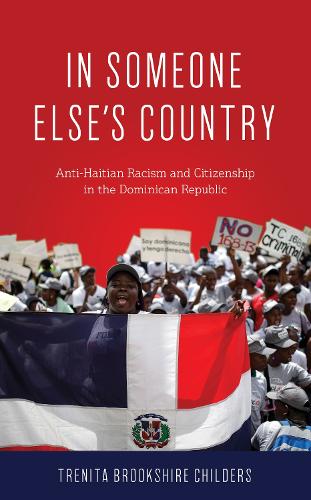
In Someone Else's Country: Anti-Haitian Racism and Citizenship in the Dominican Republic
(Paperback)
Publishing Details
In Someone Else's Country: Anti-Haitian Racism and Citizenship in the Dominican Republic
By (Author) Trenita Brookshire Childers
Bloomsbury Publishing PLC
Rowman & Littlefield Publishers
11th August 2020
United States
Classifications
Tertiary Education
Non Fiction
Development studies
Development economics and emerging economies
Migration, immigration and emigration
305.80097293
Winner of C. Wright Mills Award 2020
Physical Properties
Paperback
194
Width 154mm, Height 231mm, Spine 13mm
318g
Description
In this groundbreaking work, Trenita Childers explores the enduring system of racial profiling in the Dominican Republic, where Dominicans of Haitian descent are denied full citizenship in the only country they have ever known. As birthright citizens, they now wonder why they are treated like they are in someone elses country.
Childers describes how nations like the Dominican Republic create stateless second-class citizens through targeted documentation policies. She also carefully discusses the critical gaps between policy and practice while excavating the complex connections between racism and labor systems. Her vivid ethnography profiles dozens of Haitian immigrants and Dominicans of Haitian descent and connects their compelling individual experiences with broader global and contemporary discussions about race, immigration, citizenship, and statelessness while highlighting examples of collective resistance.
Reviews
Childers (American Institutes for Research) presents an ethnographic study of race embedded in place, resulting in dichotomies of free versus unfree and citizen versus resident. Through her field research, she enables undocumented Haitians in the Dominican Republic to tell their stories of racism and alienation that attest to the stigma associated with "Haitian-ness." Anti-Haitian racism is institutionalized in the DR, creating a liminal space in which Haitians live and work in enclaves, unable to leave without documentation and also unable to acquire the necessary documents in a system stacked against them. In the absence of formal identification, skin color, features, and accent are most often used to identify Haitians and to deny them the formal identification they lack. In a perpetual circle of legal codes, Haitians in the DR exist as low-cost, second-class labor, exploited by their Dominican employers. They have no legal identity, only the shared stigma of being Haitian. This book's strength lies in using subjects own words to discuss their plight. . . Summing Up: Recommended. General readers and lower-division undergraduates. * Choice Reviews *
This text does an excellent job of unpacking the nuances and complexities of Haitians and people of Haitian descent living in the Dominican Republic. It is a story of labor exploitation, the residual and persistent impact of the trans-Atlantic slave trade, and the continued obsession in the Americas of constructing race through political mechanisms. -- Angela J. Hattery, George Mason University
This beautifully executed ethnography pairs the process of excising multiple generations of a people from a countrys polity with its myriad manifestations, small and consequential, in everyday life. The result is an outstanding analysis of the intersection of race and liminal legality, shedding light on a case that has enormous theoretical significance. Highly recommend! -- Cecilia Menjvar, Dorothy L. Meier Chair in Social Inequities, UCLA
Author Bio
Trenita Brookshire Childers, a 20142015 Fulbright Scholar, is a health researcher at the American Institutes for Research. Previously, Dr. Childers was a Peace Corps volunteer in the Dominican Republic. She received her PhD in sociology from Duke University.
